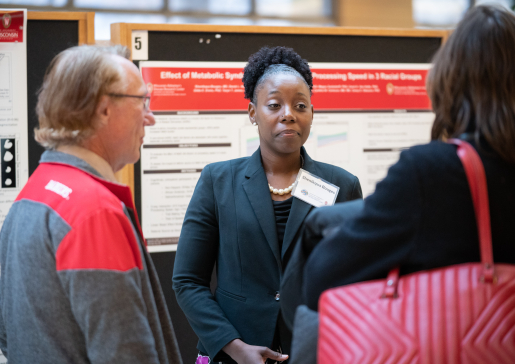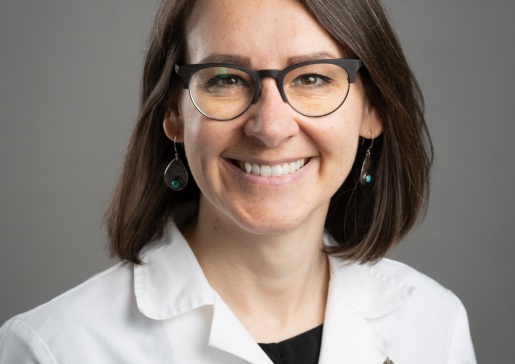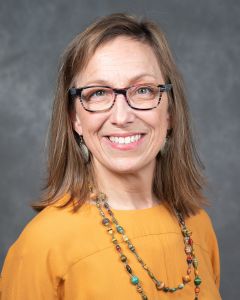About Our Program
The two-year VA Fellowship in Advanced Geriatrics offers opportunities for physicians, dentists, and post-doctoral associated health professionals to develop expertise in geriatrics.
Fellows also complete scholarly projects aimed at improving the health and well-being of older veterans through innovative clinical programs, education, research, or policy initiatives.

Meet Our Program Director
“Our fellowship is a unique opportunity to pursue your academic interests in aging with the support of an experienced mentor who will help you achieve your goals. It also makes you part of something bigger: a community of like-minded scholars and mentors with a legacy of improving the care of older veterans through research, education, and innovative clinical programs."

Why You'll Love Our Program
- Explore your individual interests in aging topics with the support of locally-based mentors who are national leaders in education, clinical care, and research
- Join a network of fellows across the country who seek to improve the care of older veterans
- Develop a scholarly portfolio through mentored projects to launch your career in academics
How to Apply
- Eligibility: All Prospective Fellows
- Fellows can be clinicians or non-clinical scientists, as long as they have an interest in geriatrics.
- Clinical applicants will be eligible to participate in this program provided they have completed all requirements needed to be a fully credentialed independent practitioner or otherwise meet VA qualification standards for their profession (with the exception of certain associated health professions who require additional training hours prior to licensure).
- Applicants must be U.S. citizens and should demonstrate interest in pursuing a VHA career with health care research as a significant focus.
- Eligibility: Physician Fellows
Graduate Medical Education Requirements
- All physicians must have completed an ACGME or American Osteopathic Association (AOA)-accredited specialty or subspecialty residency training program
- Internal or Family Medicine: Completed fellowship in Geriatric Medicine or another specialty
- Psychiatry: Completed fellowship in Geriatric Psychiatry
- Other: N/A
Licensure
- Eligible for an active, full, and unrestricted license to practice in Wisconsin
Board Certification
- Internal or Family Medicine
- Board certified in primary specialty or Board eligible in primary specialty and actively pursuing certification
- Board eligible in subspecialty
- Psychiatry
- Board certified in primary specialty or Board eligible and actively pursuing certification in primary specialty
- Board eligible in subspecialty
- Other
- Board eligible in primary specialty or Board eligible and actively pursuing certification in primary specialty
- Graduates of non-U.S. Medical Schools
- Have required Education Commission for Foreign Medical Graduate (ECFMG) documentation
- Non-US Citizens
- May be appointed when qualified citizens are not available
- Hold an H-1B visa
- Eligibility: Nurse Fellows
Training
- Possess an advanced (doctoral or masters) degree from an accredited program in nursing and meet the qualification standards that would make them eligible for VHA hire.
Licensure
- Have a nursing license (e.g., RN, NP) and be either credentialled or boarded with a scope of practice consistent with their licensure and prior training.
- The license must be maintained throughout the fellowship to maintain eligibility for participation
Citizenship
- U.S. citizen
- Eligibility: Psychology Fellows
Training
- Possess a doctoral degree from an accredited doctoral program that would make them eligible for VHA hire.
- Fellows can begin if the degree is not yet formally conferred if they have met all requirements (including dissertation defense) and documentation is presented from the fellow’s graduate program.
- Doctoral programs must be American Psychological Association (APA), Canadian Psychological Association (CPA) or Psychological Clinical Science Accreditation System (PCSAS) accredited.
- The applicant’s degree must be in a specific specialty area recognized by one of these accreditation bodies and meet VHA hiring eligibility requirements. Note: an applicant with a degree from a program accredited for a school psychology specialty is not eligible for the fellowship because this specialty is ineligible for VHA hire.
- Have completed all requirements to become a staff psychologist at a VA facility, either as a licensed independent practitioner or as a graduate psychologist subject to supervision.
- Graduate psychologists subject to supervision must meet the following additional requirements:
- Have completed an APA or CPA-accredited internship (or a new OAA funded, VHA-based internship that is not yet accredited).
- All components of doctoral training must be completed before starting the fellowship.
- If an applicant applies before all requirements are completed, the Director of Clinical Training at the applicant’s graduate school and the PD must complete the VA Psychology Postdoctoral Verification form.
- The local program must develop a written supervision plan, effective on the first day of training. This plan must include at least 4 hours of supervision weekly, of which 2 hours must be individual, face-to-face supervision by a licensed and privileged psychologist. In addition, the written supervision agreement should meet jurisdictional requirements for licensure in any state.
Citizenship
- U.S. citizen
- Possess a doctoral degree from an accredited doctoral program that would make them eligible for VHA hire.
- Eligibility: Associated Health Fellows (other than Psychology)
Training
- Possess an advanced (doctoral or masters) degree from an accredited program in their respective profession and meet the qualification standards that would make them eligible for VHA hire.
- Have completed all requirements to become a fully credentialed independent practitioner (or the equivalent for that profession) at a VA facility.
- Not be simultaneously enrolled in any other accredited clinical training program.
Licensure
- Have an active, unrestricted license to practice in the U.S. if such licenses are required for entry-level VHA employment in the candidate’s profession.
Eligible Professions
- Nursing
- Dentistry
- Optometry
- Psychology
- Podiatry
- Pharmacy
- Audiology
- Speech Language Pathology
Citizenship
- U.S. citizen
- Eligibility: Non-clinical Fellows
- Must possess a doctoral degree (e.g. PhD., DPH, ScD) and have training or demonstrated interest in aging.
- These applicants would be appointed as non-clinical scientists.
Please email applications to Elizabeth Chapman, MD, program director, at least six months in advance of your desired start date. Applications should include:
- A letter of interest from the applicant that includes the area(s) of scholarly interest, proposed scholarly project, and anticipated service of project on veterans
- Current Curriculum Vitae
- Three letters of recommendation, including one from a proposed project mentor
Graduate Success
- 100% of the Advanced Geriatrics fellowship graduates in the last three years were hired into academic positions
- Fellows produce a mean of four publications during the training period
- Fellows have successfully used their training time to apply for future research funding, including VA Career Development and University of Wisconsin Institute for Clinical and Translational Research Awards
Meet an Alum: Mary F. Wyman, PhD
Advanced Fellow 2019-2021
Post-Graduate Employment: Staff Psychologist, William S. Middleton Memorial Veterans Hospital
Dr. Wyman is a clinical geropsychologist and a GRECC-affiliated clinical psychologist investigator at the Madison VA. Her work as a fellow led to a career development award to study how engagement of family caregivers can improve outcomes for older Veterans with chronic conditions, including dementia.
How our fellowship helped prepare her: "I felt fully supported to engage in unique opportunities for research and education, as well as to pursue my own unique career goals. The fellowship support allowed me to successfully obtain a VA career development award and transition into a full-time VA mental health position. As a clinical psychologist, I appreciated the interdisciplinary focus of the fellowship experience, which further prepared me for excellence in my research, teaching and clinical roles."
Curriculum
- Didactic Experiences
Fellows attend division conferences throughout the year, plus these conferences:
- AFiG EXCellence in Education Leadership, and Scholarship (EXCELS). Once-monthly, virtual seminar where all Advanced Fellows in Geriatrics, as well as mentors, program directors, faculty, and colleagues, may network to learn critical skills for being leaders in geriatric research, education, and clinical innovation.
- Geriatric Medicine Core Lecture Series. Lectures on key geriatric medicine topics, led by area content experts
- GRECC Webinar Series. A live, virtual conference series that shares the research, education, and clinical innovations developed by GRECC leaders across the country
- Scholarly Activity
Year One:
- At 3 months: complete research proposal
- At 6 months: obtain IRB approval of project
- At 9 months: present at Division Journal Club
- At 12 months: submit initial work for presentation at a local or national society meeting
Year Two:
- Submit a manuscript for publication to a journal
- Present project(s) at Division Grand Rounds
- Fellows' Scholarly Activity Examples
- Aaron Kuntz, MD: Following his training in Hospice and Palliative Medicine, Dr. Kuntz joined the Advanced Geriatrics fellowship with the goal of developing his skills in quality improvement while enhancing the quality of care delivered to older adults with advanced diseases, including Alzheimer’s Disease and oxygen-dependent COPD. He assisted in the quantitative evaluation of the VA’s Cognitive Care Clinic, a unique interprofessional clinic for people with advanced dementia that incorporates expertise from Speech Language Pathologists, Social Workers, Neuropsychologists, Nurses, and Physicians to best serve veterans and their care partners.
- Daniel Liebzeit, PhD, RN: During his fellowship, Dr. Liebzeit assisted in evaluation of an innovative VA inpatient geriatric consultative service, the Elder Veterans Prevention Program. He provided guidance to measure quantitative outcomes, supported program dissemination through manuscripts, and conducted a qualitative analysis of nurses’ experiences with the program.
Core Faculty
- Steven Barczi, MD, GRECC Associate Director/Clinical
- Roz Anderson, PhD, GRECC Associate Director/Research
Mentoring
We know mentorship is imperative in guiding the next generation of academically oriented subspecialists, and we have a program in place to support your career planning and development.
- Mentorship Structure
-
Prospective fellows identify a mentor from our VA GRECC faculty when applying for the advanced fellowship.
You’ll meet with your mentor and the program director regularly based on your needs. As your vision for the fellowship evolves, the program director will assist you ensuring you have the right mentors to help you achieve your goals.
- The Ways We Mentor You
-
- Scholarly Project Development and Dissemination. Your faculty mentor will help guide you through the process of developing a scholarly project, from seeking IRB approval or exemption and launching your project to analyzing data and disseminating your findings.
- Career Development. Your faculty mentor and the program director will support you during your training and beyond. You will receive guidance on building a CV and portfolio, applying to jobs, networking with other VA sites, and seeking out a career path in the field.
Vision and Mission
Vision Statement
Improving healthcare through advanced training of emerging interprofessional leaders
Mission Statement
The VA Fellowship in Advanced Geriatrics aligns closely with Veterans Health Administration (VHA) initiatives to meet the current and emerging needs of Veterans. To aid in attaining the VHA’s mission to provide “exceptional health care,” the VA Fellowship in Advanced Geriatrics broadly targets training in health care education, advanced clinical practice, research, and policy initiatives that improve the health and well-being of our Nation’s Veterans.

